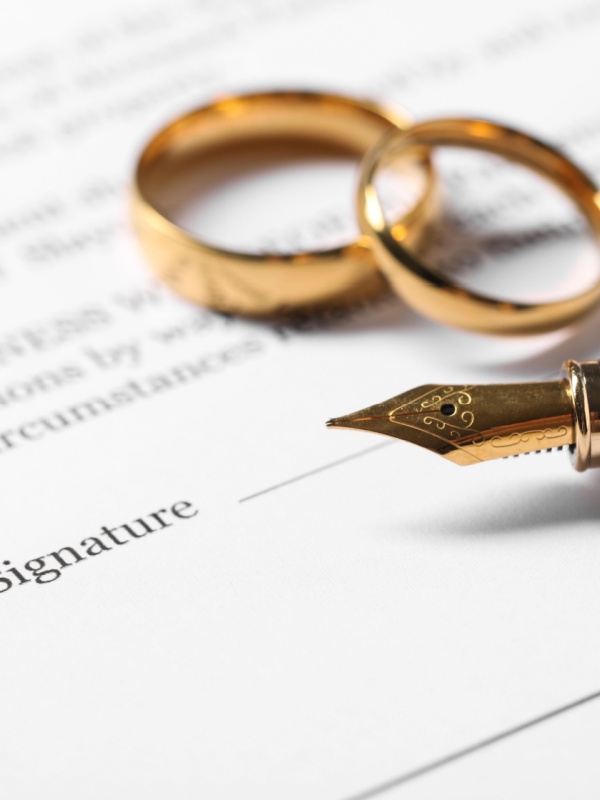Postnuptial Agreement Solicitors
- Family law specialists focused on financial agreements
- Postnuptial agreements based on your specific circumstances
- Protecting assets including property, inheritance and businesses
- Independent legal advice for both parties
- Clear fixed fees with flexible payment options
- Skilled in high-value and complex financial arrangements
- Helps reduce the risk of future disputes or litigation
- Fast, efficient service with full legal accuracy
- Consultation in London, Manchester or remotely
BOOK A FREE CONSULTATION
We do not offer Legal Aid.










We will always get the best possible result for our clients!
We represent you with a proactive & forward-thinking mindset.
The Role of Post-Nuptial Agreement Solicitors
The Role of Post-Nuptial Agreement Solicitors
While many couples enter marriage and civil partnership with the best of intentions, circumstances can change over time – making it important to clarify financial arrangements even after the wedding. A postnuptial agreement is a legal document that sets out how a couple’s assets, property rights and finances will be divided in the event of a separation or divorce. Such agreements provide peace of mind, clarity and protection for everyone involved.
Postnups are particularly useful when financial situations shift after marriage – for example, following the acquisition of significant assets, the receipt of inheritance or changes in family dynamics.
At Osbourne Pinner Solicitors, our experienced family law team specialises in drafting and advising on legally robust postnuptial agreements. We work closely with both you and your partner to ensure such agreements are transparent, fair and legally compliant – helping you protect your future with confidence. Above all, we’ll help you avoid undue pressure on your relationship both now and in the future.
To speak with one of our family solicitors, contact us today at [email protected] or call 0203 983 5080. We offer free 30-minute consultations at our offices in Harrow, Canary Wharf, Piccadilly Circus or Manchester, as well as by phone or video call.
Free Initial Consultation
Flexible Payment Options
Clear Advice
Rapid Resolution
Are Postnuptial Agreements Legally Binding?
A postnuptial agreement – often referred to as a “postnup” – is a written contract entered into by a married couple after their wedding or civil partnership ceremony. It outlines how assets, finances and other personal matters will be dealt with in the event of a future divorce or separation.
While similar in nature to a prenuptial agreement, a postnup is created during the marriage or civil partnership – often in response to significant life changes such as acquiring new property, receiving an inheritance, starting a business or having children. A prenuptial or postnuptial agreement provides both clarity and reassurance about how financial matters would be resolved, should the relationship break down in the future.
Though not strictly legally binding in the UK, courts increasingly recognise post-nuptial agreements following divorce – especially where they are entered into freely, with full disclosure of finances, legal advice and where the terms are considered reasonable.
A professionally drafted postnup helps reduce the risk of future disputes, supports long-term financial planning and can protect assets for children from previous relationships or family wealth.
If you are considering a postnuptial agreement, it’s important to seek legal advice early to ensure the document is enforceable and tailored to your specific circumstances.

Why Consider a Postnuptial Agreement?

A postnuptial agreement works to give couples the opportunity to define how their finances and assets should be managed in the event of a future separation. Unlike a prenuptial (or pre-nuptial) agreement, it’s created during the marriage – often prompted by changes in wealth, family structure or financial priorities.
Postnups are particularly valuable for couples who didn’t sign a prenuptial agreement before getting married but now wish to put formal protections in place. They can help ringfence inherited wealth, clarify what happens to a family business or set out arrangements for children from previous relationships.
Far from being a sign of distrust, a prenuptial or postnuptial agreement is a proactive step that can actually promote stability. By addressing potential issues in advance, couples reduce the likelihood of conflict and costly court proceedings in the case of a marriage or civil partnership breakdown.
Without a postnuptial agreement, any division of financial assets will be left to the discretion of the family court – which may not align with your personal intentions or financial goals. By contrast, a well-drafted postnup ensures your voice is heard and your financial interests are protected.
At Osbourne Pinner, we work with couples at all stages of marriage or civil partnership to draft clear, enforceable postnuptial agreements that reflect their evolving needs and priorities.
What Does a Post-Nup Cover for Your Marriage or Civil Partnership?
A postnuptial agreement can address a wide variety of financial matters, shaped around your priorities and the life you’ve built together since getting married. While each legal agreement is unique, there are several key areas that couples commonly choose to cover.
You may wish to define how the family home or any jointly owned properties would be treated if the marriage ends. Many couples also use a postnup to safeguard inherited assets, manage interests in a growing business or set out the division of savings, investments or pensions.
Other provisions might include how debts will be handled, whether either party will provide financial support after separation or how valuable personal items should be allocated. If you’ve received gifts or financial support from relatives, a postnup can help ensure those contributions are respected.
Although post-nuptial agreements can’t be used to make binding arrangements about child maintenance, they can still reflect a couple’s understanding or preferences regarding future family support.
At Osbourne Pinner, we help you consider all relevant financial aspects to create an agreement that is practical, fair and designed to protect your long-term interests.

The Legal Process for Creating a Postnuptial Agreement
Although prenuptial and postnuptial agreements are becoming more common, they must be carefully prepared to ensure they carry legal weight if ever relied upon in court. Following the correct process helps ensure your agreement is fair, enforceable and reflects the intentions of both spouses or civil partners.
1. Discussion & Disclosure
Both partners must be open about their financial position. This includes sharing details of financial assets, income, debts and any anticipated changes, such as future inheritance or business growth.
2. Independent Legal Advice
Each party should take advice from separate solicitors. This ensures that both understand their rights, the financial implications of the agreement and that no one is being pressured into signing.
3. Drafting the Agreement
Your solicitor will prepare a written agreement tailored to your circumstances. It should clearly outline how financial matters will be handled if the marriage ends, including property, savings, income and any financial support.
4. Review and Amendments
Once drafted, both parties and their solicitors should review the agreement to confirm it is fair and reasonable. Amendments can be made to ensure it reflects shared intentions.
5. Signing the Agreement
Once both sides are happy, the agreement is signed. It is important that this is done voluntarily and ideally with time for reflection – rushed or last-minute agreements may not hold up in court.
While prenuptial and postnuptial agreements are not automatically binding in UK law, courts increasingly uphold them where the process has been followed properly and the outcome is reasonable.
At Osbourne Pinner, we aim to make postnuptial agreements enforceable, offering clarity and protection for everyone involved if the relationship ends. We manage the entire process with care and discretion – ensuring the agreement is both practical and legally robust.
What Our Family Law Team Can Do for You
Tailored Legal Guidance
We offer strategic legal advice based on your individual circumstances, giving you a full understanding of whether a postnup is the right agreement for you.
Bespoke Agreement Drafting
Our solicitors create fully customised agreements that reflect your priorities and financial situation, providing clarity on everything from asset protection to future support.
Support with Financial Disclosure
We assist you in preparing clear and accurate financial statements, ensuring your agreement meets the legal expectations around openness and fairness.
Legal Advice for Both Parties
We provide independent legal representation, making sure both sides understand the implications of the agreement and that it is entered into freely.
Clear Pricing Structure
Our services are offered on a fixed-fee basis, so you know exactly what to expect with no hidden charges.
Responsive and Flexible Service
Whether you prefer to meet in person, by phone or online, our team is available to offer timely support and practical solutions tailored to your schedule.
Schedule Your Complimentary 30-Minute Consultation
At Osbourne Pinner, we provide trusted advice on prenuptial and postnuptial agreements to help you protect your financial future and clarify your intentions within marriage. Whether you’re considering drafting a new agreement or reviewing an existing one, our specialist lawyers offer clear, practical guidance every step of the way.
Book your free 30-minute consultation at one of our convenient locations in Piccadilly Circus (Central London), Harrow (North London), Canary Wharf (East London) or Manchester City Centre, or connect with us via phone or video call.
For further information, arrange a consultation with our team today. You can email [email protected], call 0203 983 5080 or complete our online enquiry form. Take the first step to securing your peace of mind today.
BOOK A FREE CONSULTATION
We do not offer Legal Aid.
Frequently Asked Questions About Postnuptial Agreements
A postnuptial agreement is a legal contract made between spouses after they are married or in a civil partnership. It sets out how assets, finances and other matters will be handled if the relationship ends, helping to clarify financial rights and responsibilities.
While both agreements cover similar issues, a prenuptial agreement is signed before marriage or partnership, and a postnuptial agreement is created afterwards. Postnups are often used when couples want to formalise financial arrangements after marriage due to changes in circumstances, such as a career change for one partner.
Postnuptial agreements are not automatically legally binding under UK law. However, courts increasingly give weight to them when they are fair, both spouses or civil partners have received legal advice, disclosure has been made, and the agreement was entered into freely and without pressure.
Postnups can cover division of property, protection of business assets, inheritance rights, management of debts, spousal support and maintenance, and allocation of savings or investments. Although they cannot make enforceable arrangements regarding child arrangements and child maintenance, they may include non-binding intentions about children’s financial support.
Both spouses should receive legal advice from separate solicitors to ensure they fully understand the agreement and their rights. This is crucial to increase the chances the agreement will be upheld by the courts.
While it is possible to draft an agreement without legal help, it is strongly recommended to use a solicitor. Proper legal advice ensures the agreement is clear, comprehensive and fair, reducing the risk it will be challenged or disregarded later.
Without a postnuptial agreement, financial matters in the event of separation or divorce will be decided by the court according to statutory law. This may not align with your personal wishes or intentions and can result in lengthy and costly proceedings.
Yes, a postnuptial agreement can be varied or revoked if both parties agree and follow the correct legal process. It’s important to keep the agreement under review to ensure it remains relevant to your circumstances.
The timeframe depends on the complexity of your finances and how quickly you can provide necessary information. Generally, the process can take several weeks to a few months, especially if there are negotiations or amendments to the agreement.
Yes, full and honest disclosure of all assets, liabilities and income is essential. Without this, the agreement may be considered invalid or unfair by the court.
Absolutely. Postnups can specify how business interests should be treated, protecting them from division or sale during divorce proceedings and ensuring continuity.
As with a prenuptial agreement, both parties entered must agree to on a postnuptial agreement voluntarily. If one party refuses, the other cannot impose it. However, legal advice may help explain the benefits and encourage an open discussion.
Costs vary depending on complexity and legal fees. Osbourne Pinner offers fixed-fee options so you can budget with confidence. Contact us for a detailed quote tailored to your needs.
















